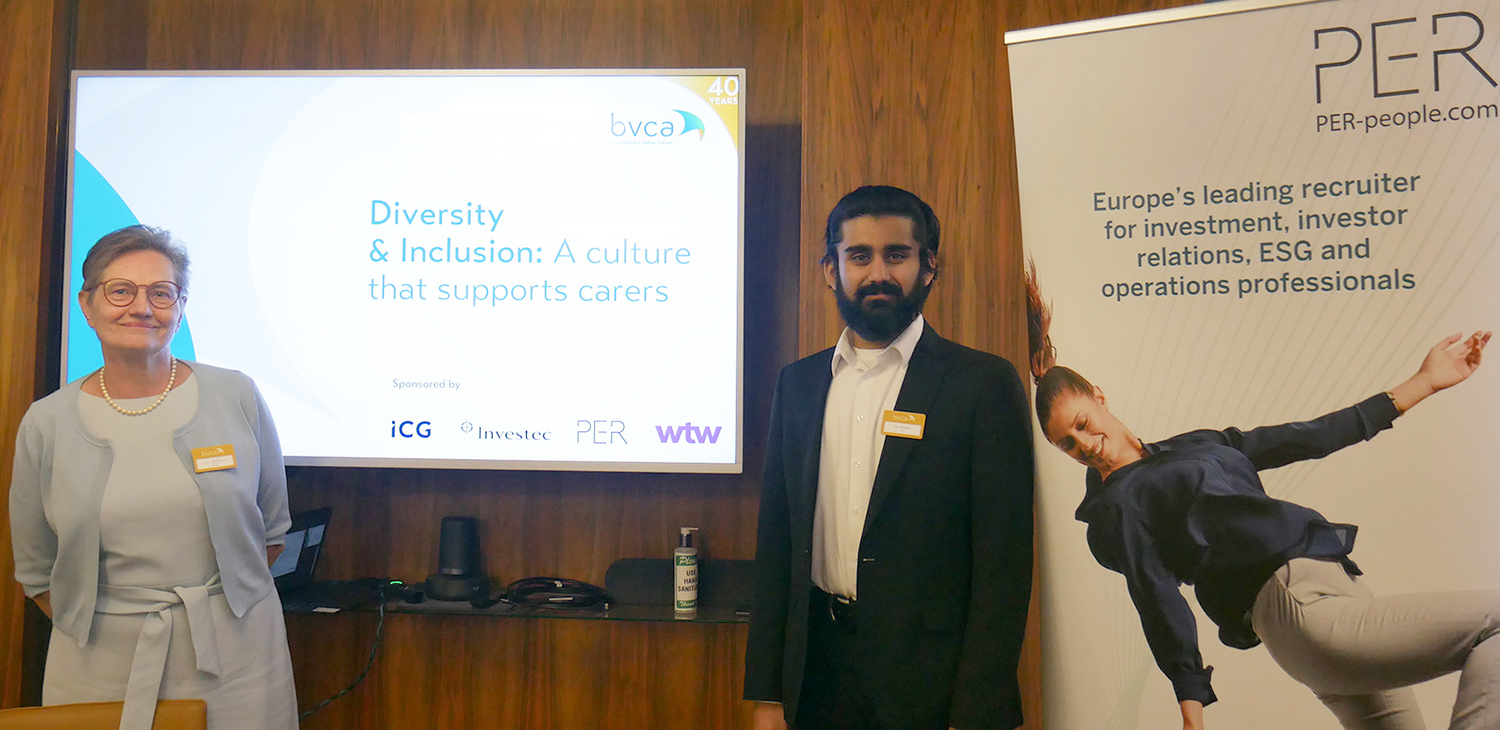PER were among the sponsors of the BVCA Culture for Carers event hosted in a roundtable room in the Athenaeum Hotel. Suzi Gillespie, Head of Research at the BVCA, introduced the key speakers, whose personal accounts gave us a sense of the challenges professionals face when they take on the care of a parent, child or friend.

Working carers may not agree with the touted wisdom that everyone has the same number of hours in a day. When a good deal of time is spent caring for another person – attending to their daily needs, taking them to medical appointments, supporting them emotionally – this can encroach on a person’s work life in a big way. Career progression can seem a pipe dream under such conditions, when the goal is just to find enough time to take a shower, grab a bite to eat, and get adequate sleep. Over ten million people in the UK are unpaid caregivers, and 600 of them leave the workforce every day to fulfil these care needs.
Gail McManus, Founder and Managing Director at PER, appreciated learning about the implications that caring responsibilities can have on people in the industry, and what leaders can do to provide support. “Individual needs require individual attention, and company policies and practices must be able to adapt to this.”
This is where workplace support networks are vital. While private equity firms have made significant progress in promoting diversity and inclusion and mitigating unconscious bias in the workplace, working caregivers can often fly under the radar. The assumption that someone may not be looking for a promotion if they’re already balancing work and care responsibilities, is an unconscious bias that can cause dejection and anxiety for the caregiver. They may feel the need to work harder, and take unsuitable opportunities, in an attempt to prove that they don’t already have too much on their plates.
Communication is the key to bridging this gap. Both speakers urged working carers to ensure they're on the radar of D&I and HR staff at their companies, and to make use of opportunities to promote understanding among colleagues. Big Society Capital has a scheme called ‘Ask a Friend’, which encourages a more open and honest culture in which questions are asked and answered without embarrassment or judgement. There are also member organisations under the Employers for Carers (EfC) scheme launched by the charity, Carers UK. These organisations operate across the public, private and voluntary sectors, covering more than 3.5 million employees, and work to raise awareness and review policies and practices.
The flip side is that caregivers may have a hard time visualising their career progression in the face of uncertain and unpredictable responsibilities. One of the speakers explained that when caregivers are awaiting diagnostic appointments for the person for whom they care, they may not know how to plan for the future. The other speaker noted that employee-assistance programmes are often under-utilised, as caregivers don’t always feel their companies understand how to provide support that will help them progress.
Communication is the key to bridging this gap. Both speakers urged working carers to ensure they're on the radar of D&I and HR staff at their companies, and to make use of opportunities to promote understanding among colleagues. Big Society Capital has a scheme called ‘Ask a Friend’, which encourages a more open and honest culture in which questions are asked and answered without embarrassment or judgement. There are also member organisations under the Employers for Carers (EfC) scheme launched by the charity, Carers UK. These organisations operate across the public, private and voluntary sectors, covering more than 3.5 million employees, and work to raise awareness and review policies and practices.
Zayn Bukhari, Research Analyst at PER, noted the humbling experience of realising that anyone could become a carer at any moment. He came away from the event eager to learn more about how he can support ambitious candidates who must factor caregiving into their careers.
There are ways of providing support to caregiving employees, and there are also strong incentives to do so. Such employees often possess a heightened sense of empathy, as they navigate the challenges of balancing work with caring for their loved ones. This empathy can translate into stronger relationships with clients and colleagues, as well as a better understanding of the needs and challenges of the businesses that private equity firms invest in. Caregivers also tend to develop strong resilience and time-management skills as they juggle multiple responsibilities. These qualities can make them more effective at managing complex projects, staying focused under pressure, and finding creative solutions to problems. By embracing and supporting employees with caregiving responsibilities, private equity firms can tap into a valuable source of talent, while also creating a more compassionate and inclusive workplace culture.

This year’s Carers Week, running from 5th-11th June, provides a great opportunity for firms across private equity to consider how best to implement carer friendly policies and build a better workplace culture.
If you work in private markets and are facing the challenges of balancing career progression and care responsibilities, we’re always happy to talk.
If you work in private markets and are facing the challenges of balancing career progression and care responsibilities, we’re always happy to talk.
Gail's profile
Zayn's profile